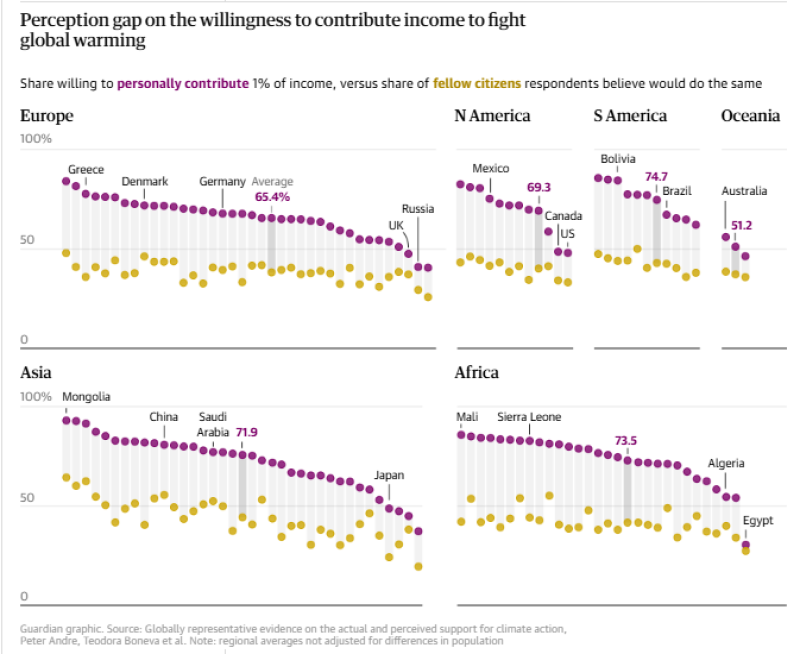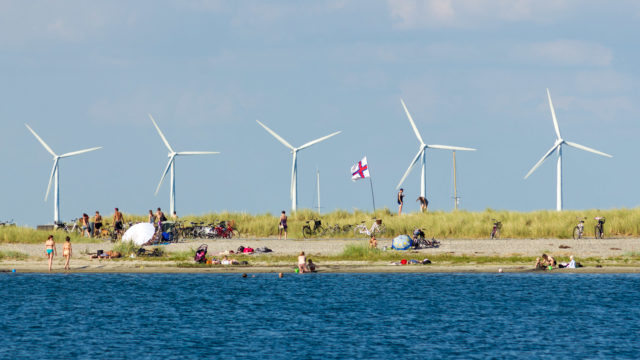Flooding the zone: a tale of two issues
Polls say that everyone, everywhere, want action on climate change. Why do so few believe this and what does it say about our media.

In the run up to our second round of Global Green Attitudes polling (see the results of the 2024 edition here), we have been reviewing public polling on climate change – seeing what’s out there and what the pollsters are saying. What’s really interesting is that it seems to conflict against what our in-country partners are reporting with their ears to the ground – and we want to figure out why.
Firstly, the polls. If you believe the pollsters, the picture is clear: despite political fragmentation and global insecurity, as well as sustained cost of living pressures, public support for tackling climate change remains high.
Support for Climate Action
The Project 89% data comes from a global survey that interviewed 130,000 people across 125 countries and found 89% thought their national government “should do more to fight global warming”.
That’s backed up by a 2025 poll from IPSOS MORI, which found that 74% of people are concerned about the impacts of climate change on their country. And just in the last few weeks, More in Common and Climate Outreach show that in Britain 74% of people think that the issue of climate change is somewhat or very important.
Furthermore, a 2024 UN poll questioned 75,000 from countries representing 90% of the global population. It found 80% wanted their governments to strengthen their climate commitments. Another recent survey of 40,000 people in 20 of the world’s most polluting countries found that 86% of people thought the same.
This support backs up what our own 2024 polling found – public support for action on sustainability, decarbonisation, and climate change remains strong and durable. And yet, across all regions, politicians, experts and ordinary people consistently underestimate the support and commitment of others when it comes to climate change.
We’re hearing from our local partners that the people they engage with are disinterested or just plain hostile to green issues. Yet the polling paints a very different picture. What’s going on?
Perception gap
Making people aware that their pro-climate view is, in fact, by far the majority could unlock a social tipping point for climate action. Across countries and regions there is a consistent finding - people under estimate the commitment of others in addressing climate change. Social proof of supporting climate causes and showing the story of transition are key to building momentum for further action.
However, a vocal minority are attempting (and in parts succeeding) to shape the narrative on this issue, achieving a disproportionate amount of media coverage and political attention.
As a contrast, the issue of immigration seems to have captured the
narrative ecosystem. What does this tell us about the media environment –
and how can we increase the salience and cut through for the issues
that really matter?

Flooding the zone
In this attention economy, the right approach seems to be to pick fights and chase headlines, instead of a measured, fact-based approach that emphasises being correct and proportionate.
Naturally, the Trump White House has mastered this strategy: flooding the zone. The basic approach is to overwhelm media and political opponents with a never-ending deluge of controversy, hyperbole, and chaos. The result is coverage, fatigue, and inadequate political responses, from opponents that are dancing to the tune of an agenda that they have not set and that they will never own.
If there is a response, and often the narrative ground is completely ceded- in some mistaken effort to not offend voters who maybe taken in by this approach, it is inadequate. The response if it comes is technical and incremental, it fails to meet the resonance of the emotional propaganda created by the other side, instead gaslighting people who have experienced years of declining living standards and increasing precarity with tepidity and technocracy. Crafting emotional value-based appeals is not beyond the progressive community, but there seems to be a crisis of confidence around political definition and courage.
Not waving but drowning
Right-leaning newspapers publish roughly 2.5 times more articles on irregular arrivals than left-leaning outlets. It’s not that these stories are more compelling than other stories. It’s that the actors that benefit from this framing are coordinating, investing and repeatedly making their case in a media environment that has been distorted to reward them and move the Overton window in their direction. We have to ask “are the laws underpinning our media environment and politics fit for purpose?” We need to a rebuild our firewall against foreign interference in our polity.
While there is an ecosystem for the far right, there is a counterforce of progressive civils society organisations. The challenge for progressive actors is one that starts with trust and culminates in solidarity. Given the well-funded relentless attacks on our policies how do we coordinate, connect and counter these forces?
- Focus on the substance, try not to get distracted by the sensationalism;
- Try to see the wood for the trees, focus on trends and expert insights to inform decisions, try and bring the medium not the short term into focus;
- Remember your mission and what you and your organisation can do in the ecosystem, you don’t have to do everything, do what you do well;
- Connect and work with others when it makes sense, sharing best practice and collective action can be uplifting and inspiring;
- Manage your energy and activity, this work requires rest as well as stepping beyond your comfort zone, you are going to need to do both.
In the past authoritarians have come to power by eroding our politics from the inside. We have to be careful to maintain boundaries between legitimate grievance and violence. We need to embrace diversity and call out attempts to delegitimize nonviolent resistance. We need to work together to create a constitutency powerful enough to change the entrenched interests of the status quo, a network of networks. This resistance will look different in different contexts but coalitions or stakeholder alliances in culturally appropriate forms are essential to creating change. In restrictive political contexts resistance looks different but the imperative of building power by connecting constituencies and networks remains.
Reset the rules
We have taken on corporate interests in the past and we need that creativity, commitment and moral clarity to regulate these bad faith actors. It is critical that we address the activity of those polluting not only our natural environment but also the information ecosystem. It is no coincidence that the politicians and media platforms that are proponents for these views are funded by one and the same. They benefit from a far right agenda and an economy that subsidises fossil fuel interests and funds this propaganda.
“ We need to be safeguarding civil society and legitimate resistance, and calling out violent protest and the hijacking of legitimate grievance.”
A collapse in trust in politicians, institutions and elites is the foundation for how both of these issues are regarded and the failure of our politicians to represent the realities of the poorest people in our societies. Our policies and our policy making must do better.
At a time when populists are wining power democratically, then dismantling the safeguards that allow them to be removed from power, we need to be safeguarding civil society, legitimate resistance as well as calling out violent protest and the hijacking of legitimate grievance. This is not an environment for cautious, precise leaders, it is a media environment powered by outrage and indignity at its worse, with emotions and values at its core. This moment calls for moral clarity, it calls for courage and comradery.
- Jean McLean


